6 releases
| 0.3.4 | Apr 21, 2023 |
|---|---|
| 0.3.3 | Apr 20, 2023 |
| 0.3.2 | Sep 30, 2021 |
| 0.3.1 | May 26, 2021 |
| 0.2.0 | Sep 3, 2020 |
#1284 in Database interfaces
24 downloads per month
3.5MB
579 lines
Contains (JAR file, 56KB) gradle-wrapper.jar
Purpose
Redis lists are wonderful as task queues for distributed workers. A worker can safely and atomically take a task, even when several ones watch the same queue.
Resc is a reliable and configurable task generator for redis.
Rules and Redis queues are defined in a configuration file, which can be in JSON or Hjson.
It watches one or several queues for events, which can be task completion notifications or simple "root" events, and applies rules to generate tasks.
It achieves this in a safe and monitorable way and takes care, for example, of avoiding duplicating tasks.
Resc is written in rust for safety and performance.
How it generally works
Queues setup
Here we'll have a very simple setup, with only 4 Redis queues and only one type of tasks (the "tasks-A") and two workers ready to do them.
We won't show how tasks are deduplicated, logged, or published for supervision.
Some Event Generator pushes an event to the "global/done" input queue
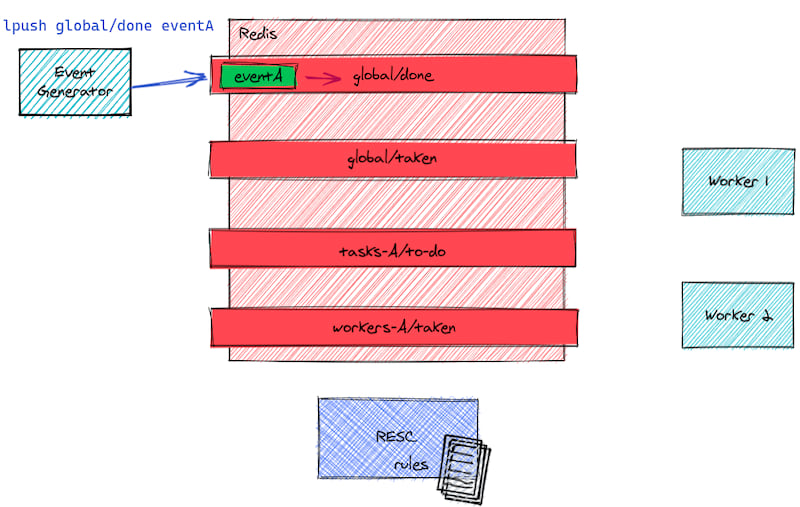
Instead of just a "global" queue, there could be several input queues but one is often enough even with hundreds of event sources.
Resc takes the event
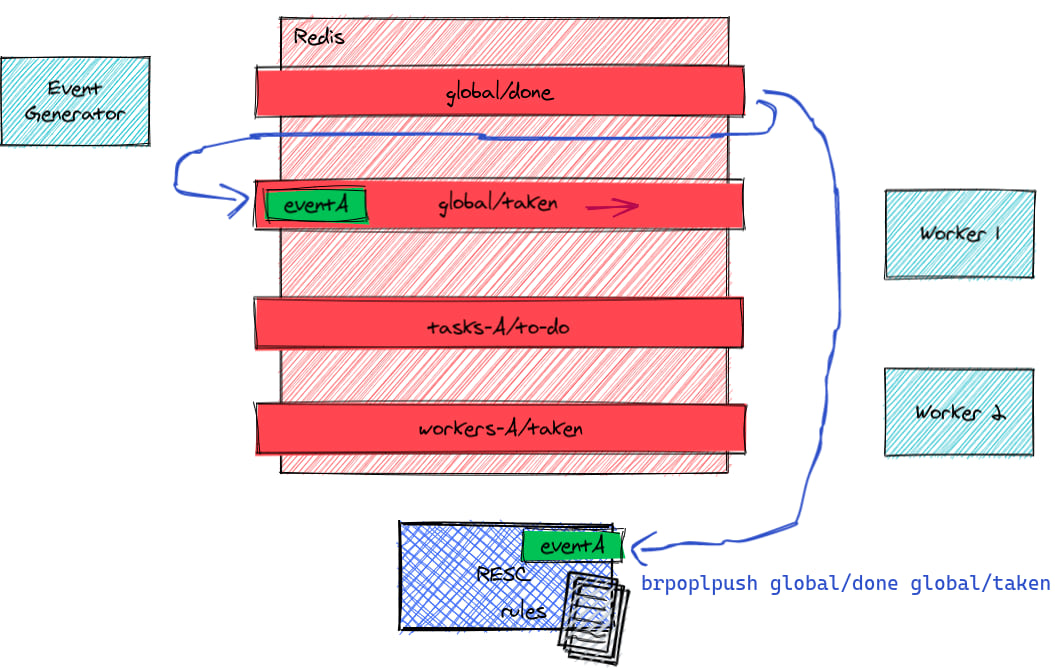
brpoplpush is an atomic operation, the event is guaranteed to not be lost: it's either in global/done or in global/taken.
Resc applies its rules to generate zero or more tasks
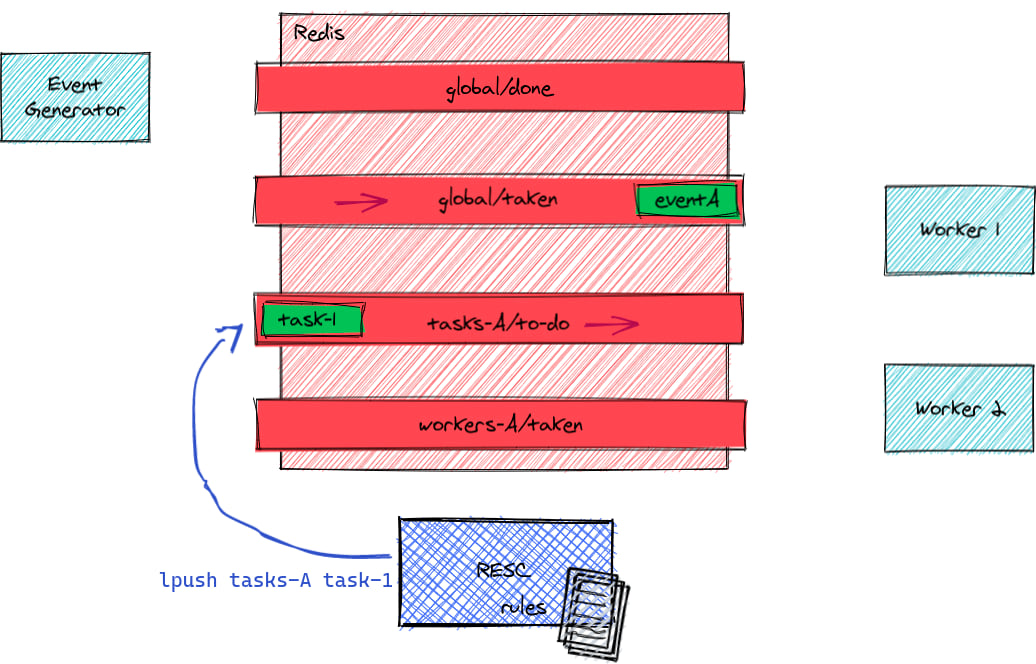
Resc removes the event from global/taken
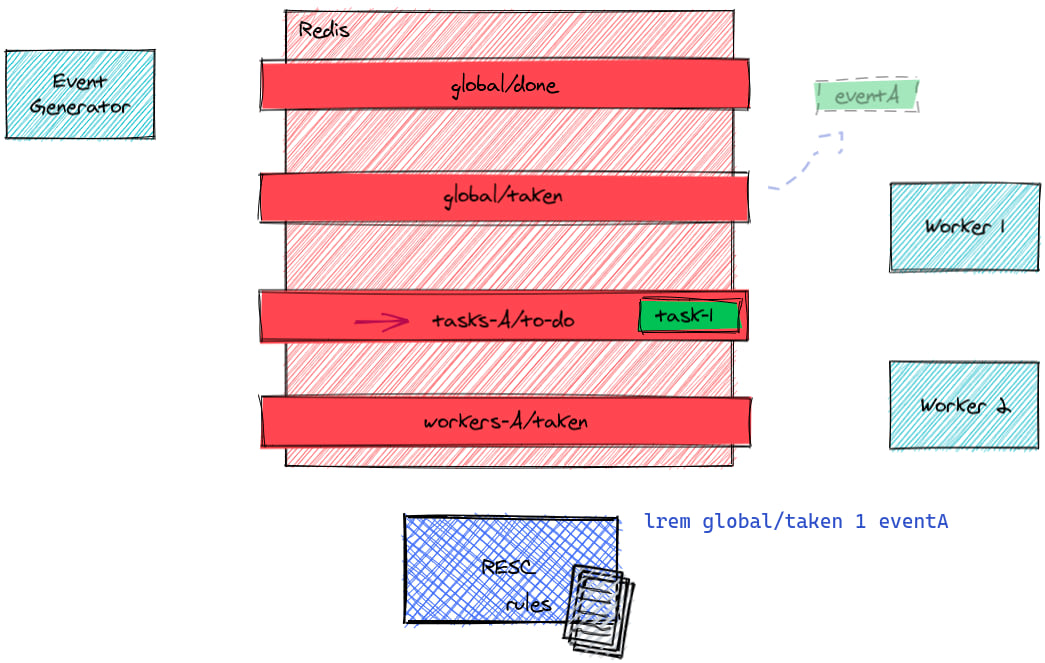
It was kept here so that the rules could be played again on restore in case of crash during rules computation (some rules may imply calling a server).
A worker takes the task
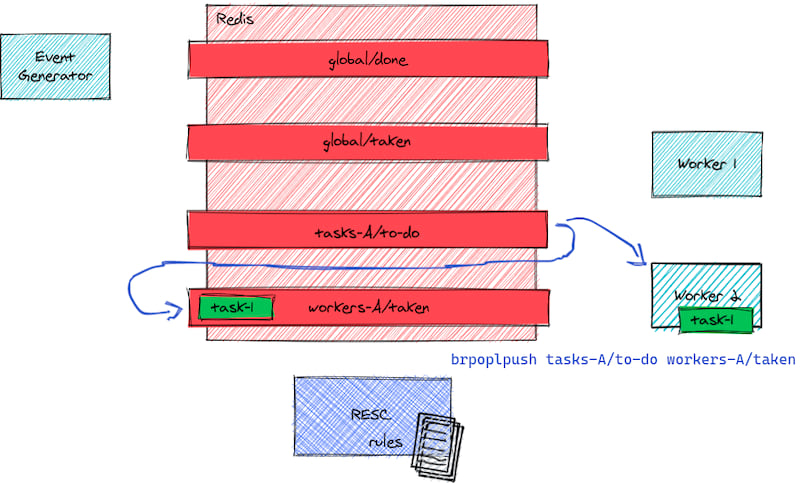
Once again, brpoplpush is an atomic operation, the worker may die during effort, knowing the task won't be lost
When the job is done, the worker notifies it with an event
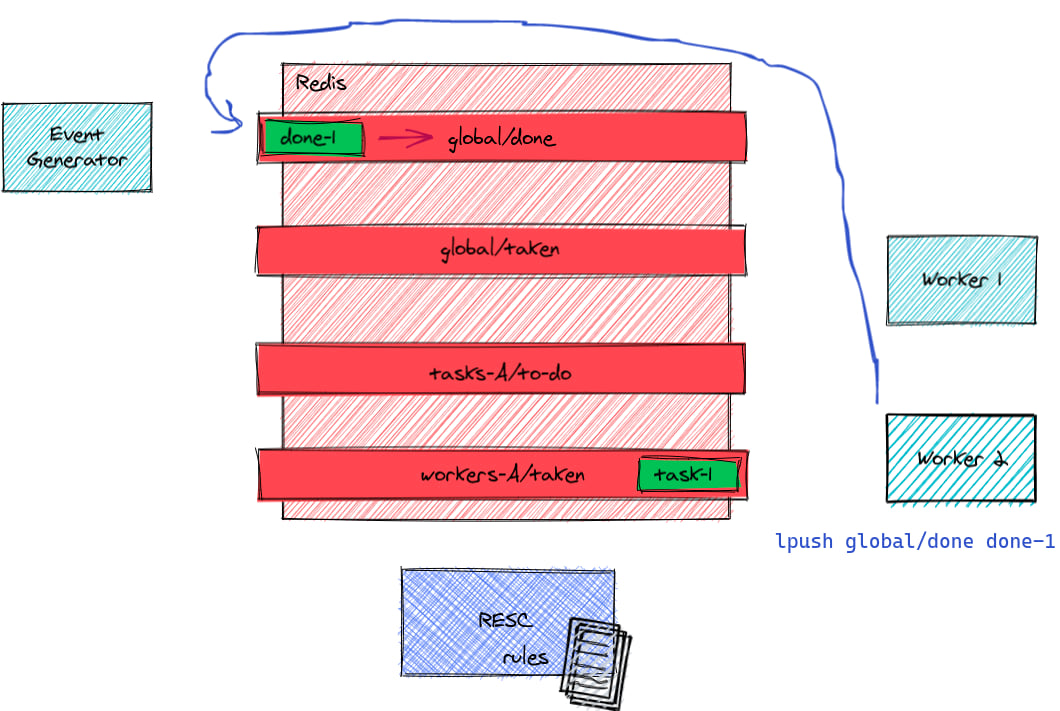
... then removes the task from its taken queue
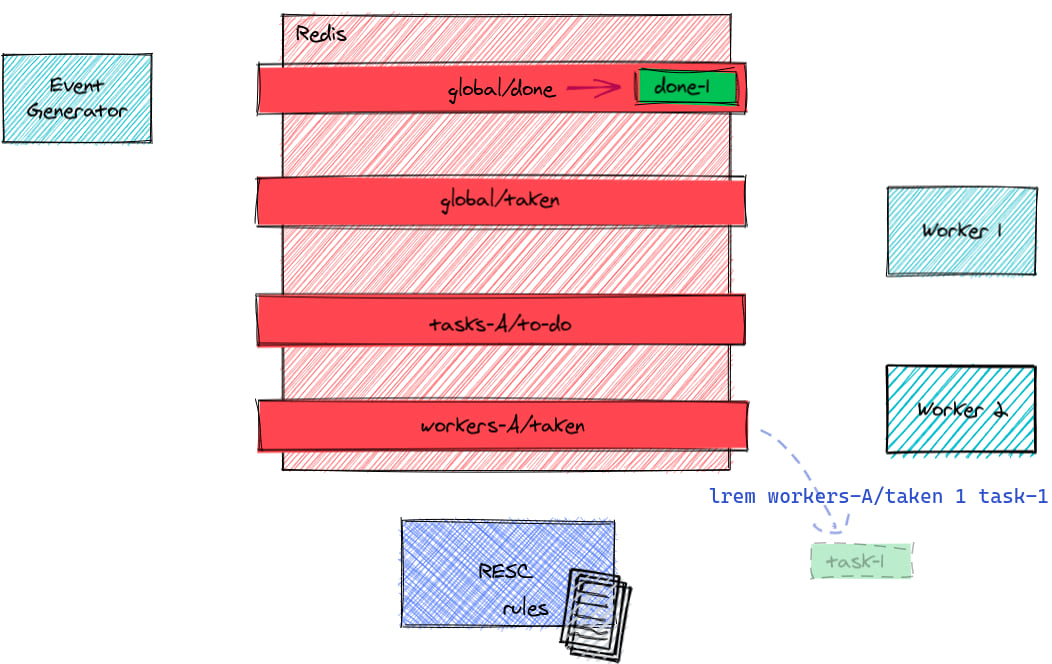
... and it goes on
Resc will now apply its rules to the done-1 event, which may lead to new tasks, or maybe there's nothing more to do.
Of course everything can happen with thousands of events, tasks and even workers.
Workers
Resc, as a scheduler, assumes workers handle tasks in this very simple way:
-
pick a task in a queue and atomically move it to a "taken" list :
BRPOPLPUSH myqueue/todo myqueue/taken 0 -
do the task
-
clean the "taken" list :
LREM myqueue/taken the-task -
notify the scheduler the task is done by pushing it to a "done" queue:
LPUSH global/done the-task
This scheme ensures several workers can safely work on the same queue.
You often want the queues to be free of duplicates. You may still want to queue tasks while they are being processed (for example you may want a recomputation because some new info arrived).
If you want deduplicating of a task queue, you declare a task set in the configuration and the worker, just after having picked the task from the queue and before executing it, remove it from the set too.
Java, Go, Rust and node.js implementations of workers are provided in the examples directory. They all show how to use (or not) the deduplicating queue.
Introductory Example
The complete instructions on executing this example, and a business logic explanation, are available at examples/simple-example.md.
Simple regex based task generation
Here's a simple Hjson configuration file:
{
redis: {
url: "redis://127.0.0.1/"
}
watchers: [
{
input_queue: global/events
taken_queue: global/taken
rules: [
{
name: TRT computation on data acquisition
on: "^acq/(?P<process_id>\\w+)/(?P<product_id>\\w+)$"
make: {
task: "trt/${process_id}/${product_id}"
queue: "trt/${process_id}/todo-queue"
set: "trt/${process_id}/todo-set"
}
}
]
}
]
}
Resc can be launched with this configuration using
resc myconf.hjson
Resc starts a watcher, a thread, over the specified input_queue.
When a new event (a string in the global/events list) appears, it's atomically moved (using BRPOPLPUSH) to the global/taken list and watcher's rules are executed.
Assuming the coming task is "acq/123/456", then the first (and unique) rule of our example will match, according to the regular expression in "on"".
Several variables are dynamically generated and valued:
process_id = 123
product_id = 456
Those variables are used to extrapolate the task and queue of the todo part of the rule.
The task "trt/123/456" would then be created.
If the "trt/123/todo-set" set doesn't contain the task already, then it's added to that set (with the time which may be used for monitoring) then to the "trt/123/todo-queue" queue.
After having executed all rules on this task, it's cleared from the "global/taken" queue and the watcher goes on watching the "global/events" queue again for other tasks.
Logging
You don't usually want a lot of log, that's why the default log includes only warnings, but during the setup of your system you might want to see what events comes in your queues and what tasks are generated.
You can see more by setting the log level to INFO:
RUST_LOG="info" resc myconf.hjson
or if you want to see what rules were activated:
RUST_LOG="debug" resc myconf.hjson
Fetching some data to compute new tasks
Sometimes it might be necessary to query a web service to compute the tasks to generate in response to an event.
Let's say there is a REST service returning the elements which would be logically impacted when some other one change (for example a change in a customer command might involve the recomputing of some product validity for that command).
If there's certain event on product 5ab7342600000040, you want to query
http://my-web-service/products/5ab7342600000040/direct-children
which responds in JSON with the list of products which should be recomputed:
[
{"processId":634876914,"productId":"5ab7e7dc00000040"},
{"processId":634876914,"productId":"5ab7ebe800000040"}
]
and for each of those products you want to generate a new task.
Then the relevant rule could be like this:
{
name: TRT propagation to children
on: "^trt/(?P<process_id>\\d+)/(?P<product_id>\\w{16})$"
fetch: [{
url: "http://my-web-service/products/${product_id}/direct-children"
returns: child
}]
todo: {
task: "trt/${child.processId}/${child.productId}"
queue: "trt/${child.processId}/todo-queue"
set: "trt/${child.processId}/todo-set"
}
}
The fetch element describes the HTTP query and the namespace of the variables read in the web-service's response and used for generation of tasks, queues and sets.
In our example, we'd end with two new tasks, "trt/634876914/5ab7e7dc00000040" (added to queue "trt/634876914/todo-queue"), and "trt/634876914/5ab7ebe800000040" (added to queue "trt/634876914/todo-queue").
Switching queues, default configuration values
When you have several rules and one of them involves querying a remote service as in our example, you don't want all the rules to suffer from a possible slow-down of this remote service.
That's when you may want to have another watcher, and thread, handling those specific task generations.
In order to do that, you want a rule just passing the task to another queue which another watcher watches.
Let's call this new queue global/to-propagate (you give your queues the names you want).
The new configuration becomes
{
"redis": {
"url": "redis://127.0.0.1/"
},
"watchers": [
{
"input_queue": "global/events",
"taken_queue": "global/taken",
"rules": [
{
"name": "TRT computation on data acquisition",
"on": "^acq/(?P<process_id>\\d+)/(?P<product_id>\\d+)$",
"make": {
"task": "trt/${process_id}/${product_id}",
"queue": "trt/${process_id}/todo-queue",
"set": "trt/${process_id}/todo-set"
}
},
{
"name": "TRT propagation to children : switch queue",
"on": "^trt/(?P<process_id>\\d+)/(?P<product_id>\\w{16})$",
"make": {
"queue": "global/to-propagate"
}
}
]
},
{
"input_queue": "global/to-propagate",
"rules": [
{
"name": "TRT propagation to children : make child tasks",
"on": "^trt/(?P<process_id>\\d+)/(?P<product_id>\\w{16})$",
"fetch": [{
"url": "http://my-web-service/products/${product_id}/direct-children",
"returns": "child"
}],
"make": {
"task": "trt/${child.processId}/${child.productId}",
"queue": "trt/${child.processId}/todo-queue",
"set": "trt/${child.processId}/todo-set"
}
}
]
}
]
}
This way no remote service can slow down the global queue managment.
You may have noticed the configuration is a little lighter than what could have been expected. It's because some settings are optional.
When omitted, taken_queue is simply input_queue with /taken added. So here the second watcher would use as temporary queue global/to-propagate/taken.
When make/task is omitted, the generated task is the same string as the input task. More precisely, the default value of make/task is "${input_task}", ${input_task} being a variable you can use in your task/queue/set generation.
License
MIT
Dependencies
~24–35MB
~601K SLoC